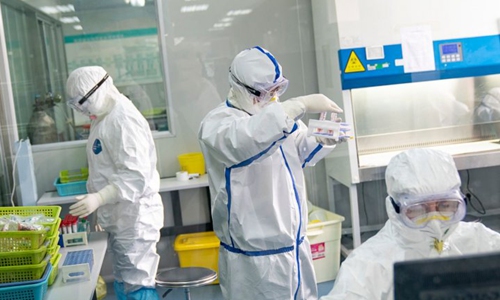Current vaccines could still be effective with mutated coronavirus: experts
By Leng Shumei and Hu Yuwei Source:Global Times Published: 2020/5/7 21:34:41

Staff members work in a laboratory in Wuhan, central China's Hubei Province, Feb. 13, 2020. As a designated service provider of nucleic acid detection of the novel coronavirus, KingMed Diagnostics laboratory in Wuhan conducts non-stop detection service and detects over 2,000 samples from various cities in Hubei Province every day. Photo: Xinhua
Recent research by US scientists indicates frequent mutations that have made the novel coronavirus more contagious and resistant to intervention, which triggered concerns over the effectiveness of vaccines currently in development, but Chinese experts said that current vaccines will still be effective as long as the mutations have not changed the virus's immunogenicity.
Scientists from the Los Alamos National Laboratory in the US released a report on BioRxiv on April 29, revealing mutations that may have resulted in easier transmission or resistance to intervention.
The scientists said they identified fourteen mutations in the virus' Spike protein, one of which is of urgent concern as research results showed that, when introduced to new regions, a virus with this mutation can rapidly become the dominant form, according to the report.
The mutation began spreading in Europe in early February then to the US and Canada and has been the dominant strain globally since March.
The scientists also discovered evidence of recombination between locally circulating strains, indicative of multiple strain infections.
The report is not the first one showing mutations of the coronavirus, which led to concerns over the vaccine and therapy development for the COVID-19 as many worried vaccines and therapies based on current data will not be effective for a virus with new mutations in the future.
There are also concerns that patients who have recovered from COVID-19 may get infected with a different strain in the future.
In response, an immunologist in Beijing told the Global Times on Thursday on condition of anonymity that current vaccines will still be effective on the virus as long as the mutations have not changed its immunogenicity.
Whether it is necessary to develop new vaccines depends on where and how significant the mutations are, according to the expert.
On April 26, Qin Chuan, the director of the Institute of Laboratory Animal Sciences under the Chinese Academy of Medical Sciences & Peking Union Medical College, told the media at a forum that no evidence of substantial mutations of the virus has been discovered so far.
Substantial mutations refer to mutations that can make current vaccines miss the target, Qin explained.
The effect of antibody-dependent enhancement (ADE) is also a problem that may lead to the failure of vaccines. But Qin clarified that no evidence of such an effect has been observed so far, referring to animal trials her team conducted on a vaccine candidate they developed.
Posted in: SOCIETY